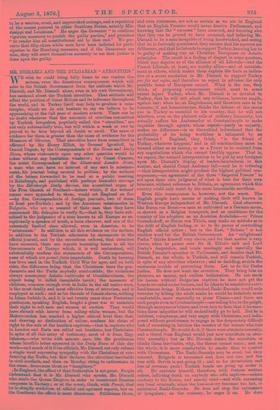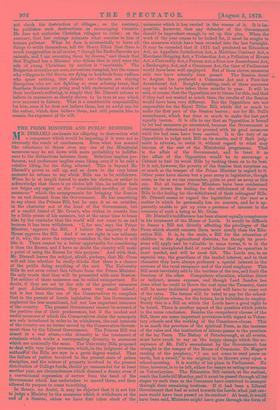MR. DISRAELI AND THE BULGARIAN "ATROCITIES."
WE wish we could bring fully home to our readers the serious, even the disastrous consequences which will arise to the British Government from the attitude which Mr. Disraeli, and Mr. Disraeli alone, even in his own Government, has assumed about the Turkish atrocities. That attitude will affect the position of Great Britain and its influence throughout the world, and in Turkey itself may help to produce a cata- strophe which we do not hesitate to say we believe to be approaching at the full pace of modern events. There can be no doubt whatever that the accounts of cruelties committed by Turkish Irregulars, popularly called the atrocities," are not only substantially true, but will within a week or two be proved to be true beyond all doubt or cavil. The mass of evidence for them is greater than the mass of evidence for the Massacre of Glencoe. That atrocities have been committed is affirmed by Sir Henry Elliot, by General Ignatieff, by Consul Dupuis, by the Correspondents of the Times and Daily News, whose statements upon any other question would be taken without any hesitation whatever ; by Count Camoro, the artist Correspondent of the Illustrated London News, a man who can have no interest of any sort in misstate- ment, his journal being neutral in politics ; lay the authors of the letters forwarded to be read at a public meeting in Edinburgh, and published with perhaps blamable courage by the Edinburgh Daily Review, the accredited organ of the Free Church of Scotland—letters which, if the writers' names were appended to them, would set England on fire —by five Correspondents of foreign journals, two of them at least pro-Turkish ; and by the American missionaries in Bulgaria, who are so assured of their ease that they have summoned Mr. Schuyler to verify it,—that is they have sub- mitted to the judgment of a man known to all Europe as ex- ceptionally a speaker of truth, a keen obeerver, and one of the extremely limited class allowed, even in :America, to be "aristocrats." In addition to all this evidence on the surface, in addition to the Turkish admission by statements in the official journal, and by the executions ordered, that atrocities have occurred, there are reports hastening home to all the Governments of Europe which, it is well understood, will substantially confirm the statements of the Correspondents, none of which are prinui facie improbable. Death by burning has been used in the Turkish Civil War for ages, and on both sides, the difference being that the Christians burn the gen- darmerie and the Turks anybody combustible ; the violations always accompany Asiatic outbreaks of bloodthirstiness, the object being to inflict inexpiable insult ; the massacre of children, common enough even in India in the old native wars, is the most deadly and most effective form of terrorism, and is employed as such ; and as for the sale of female slaves, nothing in Islam forbids it, and it is not twenty years since Protestant gentlemen, speaking English, fought a great war to maintain their right to sell men and women at auction. They would have shrunk with horror from selling white women but the Malommedan has reached a higher ethical level than that, and drawing no distinction of colour, confines his claim of right to the sale of the heathen captives,—that *captives who in London and Paris are called not heathens, but Christians. In spite of all this array of testimony, most of it from Eng- lislimen,—who write with minute care, like the gentleman whose horrible letter appeared in the Daily News of this day week—and much of it from officials, Mr. Disraeli not only refuses a single word expressing sympathy with the Christians or con- demning the Turks, but first declares the atrocities inevitable in civil conflicts, and then on Monday rising to enthusiasm in the cause, denounces them as "imaginary." In England. the effect of that declaration is not great. People understand that it is Mr. Disraeli who speaks, Mr. Disraeli who made the Queen Empress in order to counteract Russian conquests in Tartary ; or at the worst, think, with Punch, that he is sleepily credulous of official and optimist reports, but on the Continent the effect is most disastrous. Politicians there, and even statesmen, are not so certain as we are in England that an English Premier would never deceive Parliament, and knowing that the " excessea " have occurred, and knowing also that they can be proved to have occurred, and believing Mr. Disraeli to be a man incapable of being hoodwinked, and seeing that he is furiously questioned, they assume that his answers are deliberate, and that he intends to support Turkey, knowing her to be guilty of making war on Christian Europeans on Asiatic principles. The result is a feeling of disgust in some quarters, which may deprive us of the alliance of all Liberals—and the French Liberals, at least, are worthy allies—and of astonish- ment in others, which makes them explain the facts as indica- tive of a secret resolution in Mr. Disraeli to support Turkey per fas aut nefas, and therefore to reject in advance the only possible bases of European accord. What is the use, they think, of proposing compromises which must to some extent injure Turkey, when Mr. Disraeli is so devoted to Turkey, that he will not admit any evidence, however ample, against her; when he, an Englishman, and therefore sure to be humane, if not humanitarian, thinks the defenca of the status quo in Turkey so essential to his country, that he will not interfere, even on the plainest calls of ordinary humanity, but actually suffers his Ambassador at Constantinople to make inquiries through agents, whose report—justly or unjuatiy, makes no difference—is so discredited beforehand that the probability of its being worthless is intimated by an ex-Premier ? England, they think, "is the friend of Turkey, whatever happens," and in all combinations must be treated either as an enemy, or as a Power to be omitted from any negotiations which she cannot forcibly oppose. That is, we repeat, the natural interpretation to be put by any foreigner upon Mr. Disraeli's display of leaden-heartedness in this matter, and should Count Andrassy fall—and he is tottering —that interpretation might produce the highest political con- sequences,—an agreement of the three "Imperial Powers" to act upon their own judgment of what is best for their own interests, without reference to Britain, an agreement which this country could only resist by the most lamentable sacrifices.
Even this consequence is, however, not the worst. The English people have means of making their will known in Western Europe independent of Mr. Disraeli. Cool observers like Baron von Beust—a man as cultivated as a German savan, as shrewd as a Belgian bourgeois, and as ambitious for the country of his adoption as an Austrian Archduke—or Prince Gortschakoff, or Baron von Thiele, may make no mistake as to the drift of English feeling, or as to its power of controlling English official action ; but in the East, " Britain " is but another word for the British Government. An "enlightened Pasha" thinks himself very clever, and for that matter is very clever, when he passes over Sir H. Elliot's talk and Lord Derby's despatches, and reads musingly and carefully the British Premier's speeches in Parliament, and decides that Mr. Disraeli, on the whole, is Turkish, and will remain Turkish, in spite of any atrocities whatever ; and so deciding, avoids the enormous trouble of preventing them. Let us do the Pasha justice. He does not want the atrocities. They bring him no pleasure, no money, and endless botheration. Ile can stock his harem without Bulgarian captives, he does not get the hoards revealed under torture, and he likes to be considered a civi- lised human being. If those wretched Bashi-Baeouks would only terrorise by killing the adult males he would be definitely more comfortable, more especially as pious Uleiraa—and there are such people even in Constantinople—are telling him in the pulpit, through anonymous letters, and even face to face, that if he sanc- tions these iniquities he will undoubtedly go to hell. But he is indolent, voluptuous, and very angry with Christians, and indis- posed without good reason to engage in the desperately difficult task of executing in batches the cousins of the women who rule Constantinople. He would do it, if there were absolute necessity, and a threat from England would just now constitute an abso- lute necessity ; but as Mr. Disraeli denies the atrocities, or thinks them inevitable, why, the threat cannot come ; and on the whole, it is more comfortable to smoke than to vraarrel with Circassians. The Bashi-Bazouks may be cruel, but they succeed. Bulgaria is terrorised and does not rise, and the war with Servia is not going ill ; and as for devastation and loss of revenue, pooh ! Turkish bonds are going up under it all. He contents himself, therefore, with furious written orders, inflicting death on anybody who sells captives—orders contrary to the Koran, and merely wind—and with executing any local criminals, when the hue-and-cry becomes too hot, or accidental Bashi-Bazouks. He does not stop the enlistment of irregulars ; on the contrary, he urges it on. He does not check the destruction of villages ; on the contrary, he publishes such destructions as encouraging victories. He does not authorise Christian villagers to resist ; on the contrary, that last outrage exhausts what remains to him of human patience. What he does is substantially to leave all things to settle themselves, tell Sir Henry Elliot that there is much exaggeration in all stories," though the Bashi-Bazouks are animals, and I am executing them by dozens," and thank God that England has a Minister who thinks that in civil wars the sale of young Christians by auction is "inevitable." The Bulgarian atrocities are over, executions excepted, but the reason why villagers in Old Sonia are flying in hundreds from ruffians who spare nothing, that Asiatic cut - throats are slaying Europeans who are not fighting or even refusing taxes, that Southern Russians are going mad with excitement at stories of their brethren's suffering, is simply that Mr. Disraeli refuses to believe in massacres as clearly shown to be true as any which ever occurred in history. That is a considerable responsibility for him, even if he does not believe them, but an awful one for the nation, which does believe them, and still permits him to remain the exponent of its will.































 Previous page
Previous page